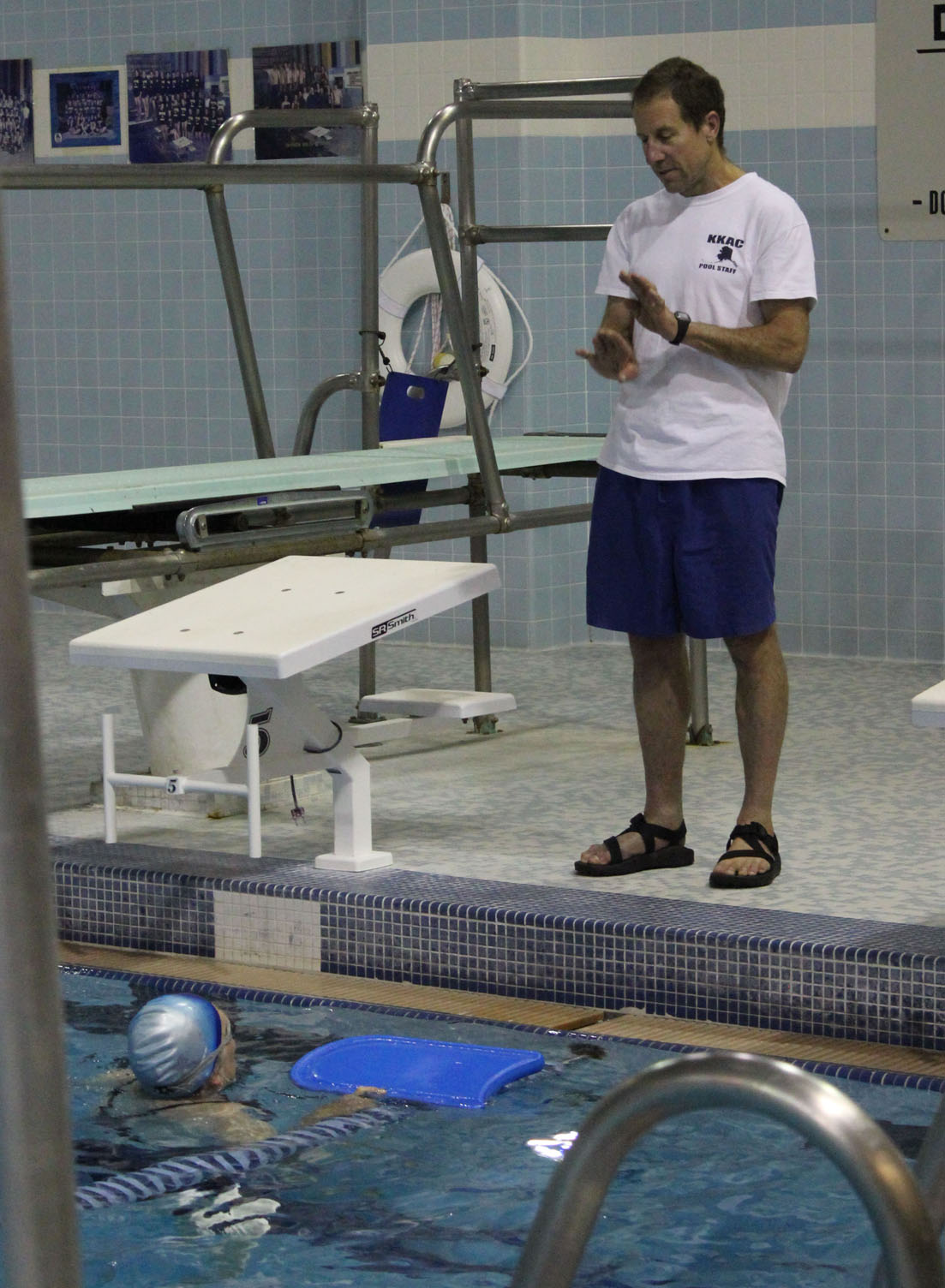Cast out a hook and you never know what’s going to bite. In the case of the Kachemak Swim Club’s search for a new coach, it appears they’ve found a keeper in Neil Romney.
“We posted the job on the Alaska Swimming site and the USA Swimming site and got some interest from across the country,” said Paul Story, president of KSC’s board of directors. “They all had pretty good credentials, but (Romney) had really good credentials and amazing references.”
After interviewing Romney by Skype, the club offered him the position, eager to make him coach “sooner rather than later, which was great.”
For his part, Romney was looking for a head-coach or head age-group coaching position where he could put his 30 years of coaching and teaching experience to use. Most recently, he taught biological sciences at Gillette College, Gillette, Wyo. Prior to that, from 2004-2012, he taught biological sciences and English literature at Skagit Valley College on Whidbey Island, Wash., and served as head coach of the North Whidbey Aquatic Club in Oak Harbor, Wash., for nine years. He directly coached the club’s top two practice groups and a masters team and administered the club’s competitive swim program, according to his resume. Under his guidance, the team grew from 35 to 120 athletes.
Romney also has coached swimming in other communities in Washington, Oregon, Kentucky and Illinois. Among the many awards he has received, in 2006, Romney was named the Pacific Northwest Swimming Head Zone Coach and the Pacific Northwest Association of Masters Swimmers Coach of the Year. He holds a master of arts degree in English literature and a master of science in exercise physiology, both from Central Washington University in Ellensburg, Wash.
In the late 1990s, Romney came to Alaska for a junior national swim meet held in Anchorage, but had not been to Homer until accepting the KSC coaching position and arriving in August.
His interest in swimming began at an early age. For a time, his attention shifted to include downhill skiing and tennis, but eventually returned to swimming. Although he never imagined coaching as a career, Romney said he found himself attracted to the year-round aspect of the sport.
“It gives the opportunity to teach lifetime skills, discipline and organization, and also allows us to train kids to a higher level,” he said. In addition, he found he liked the challenge of training swimmers for physical capacity to do well, to address psychological readiness and the complexity of the sport.
“There’s always something for someone to work on,” he said.
As the KSC coach, Romney is emphasizing the three legs of swimming: drag reduction, propulsion efficiency and physical capacity. His core goal is for the swimmers to learn the connection between effort and results.
“If they do nothing more than that, they’ll acquire many other additional attributes in the process,’ he said. “They’ll learn how to work hard and engage in the process of pursuing excellence. That means they’ll have a successful experience.”
Romney is aware that kids, who have more time to spend in the water than adults, tend to learn more readily. That said, he is careful not to push swimmers, recognizing that “a good stroke is effective only as long as it can be sustained. Push the limit and the strokes will break down when you do that. When you get tired, you can’t focus as easily and they revert to their crudest form.”
The club currently has about 70-80 members between the ages of 6-18 and Romney anticipates building college-age swimmers into the program also.
“We have room for more swimmers and encourage anybody who wants to improve their technique, physical fitness and competition to come out,” said Romney. “We strongly encourage kids to compete. If they don’t, they sometimes don’t stay in the sport that long because competition is what lends meaning to the hard work they do every day in practice.”
Since arriving in Homer, Romney also has become the Homer High School assistant swim coach and earlier this month started a masters practice which he described as an adult version of age group swimming. Called “Kachemak Masters,” the group meets at the Kate Kuhns Aquatic Center from 7-8 a.m. Monday, Wednesday and Friday.
“I always prioritize skill practice because it’s the fastest way to improve your swimming,” said Romney. “Without it, you can be the most physically fit person and still not swim particularly fast because you’re creating too much drag. Swimming is a highly nuanced, technical sport. There’s no way to develop those skills other than practice a lot.”
Kachemak Masters currently has about eight people in it, but Romney said there is room for more.
“We’re always looking for new members and welcome anybody that wants to improve his or her swimming. You don’t have to be highly skilled as long as you want to improve your swimming,” he said.
Happy to be in Homer, Romney said he is looking forward “to building the swim team into a larger, more successful program than it is. The previous coaches have invested a lot of work. I’m hoping to build on those.”
Story said Romney already is accomplishing “a lot of great things” with KSC.
“He’s a super, super smart guy and has a vision that he’s been able to implement before and is trying to work into our situation,” said Story, “We’re optimistic that it’s going to result in some kids feeling really good about themselves and achieving goals and being able to travel around the state, maybe even the country, as they get faster and faster.”
McKibben Jackinsky can be reached at mckibben.jackinsky@homernews.com.


